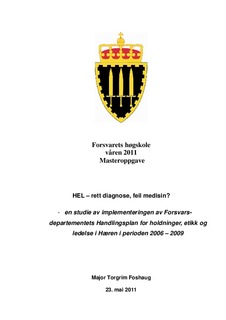HEL - rett diagnose, feil medisin? En studie av implementeringen av Forsvarsdepartementets Handlingsplan for holdninger, etikk og ledelse i Hæren i perioden 2006-2009
Master thesis
Permanent lenke
http://hdl.handle.net/11250/99988Utgivelsesdato
2011Metadata
Vis full innførselSamlinger
- Masteroppgaver [466]
Sammendrag
The purpose of this study has been to address to what extent the implementation of a public policy focused on attitudes, ethics and leadership, succeeded within the Norwegian Army in the period between 2006 and 2009. The study is based on the premise that the Norwegian Army constitutes an institutionalized organization. An operationalization of the research question was conducted through a focus on how contextual conditions impacted on the implementation, and in which way the distinctive character of the policy made an influence on the result of the implementation process. The study has been conducted as a qualitative case study, addressing the research question through a narrative analysis. The data collection is primarily based on document analyses and expert interviews. Theoretically, the study is founded on organizational theory, using instrumental, institutional and neo-institutional perspectives as described by Christensen, Lægreid, Roness and Røvik. The study further builds on contingency theory within implementation theory by using Matland’s conflict ambiguity matrix, and Røvik’s neoinstitutional translation theory which sees the policy as an institutionalized standard. Methodically the analysis of the implementation process is conducted through a focus on the separate decision points within the organization (Pressman & Wildavsky’s veto points), and the narrative analysis is divided between the public discourse that took place prior to the publication of the policy, and the internal process afterwards. The study shows that the Norwegian Army at the time of the publication was tired of organizational changes, and both the Ministry of Defence and the Norwegian Armed Forces suffered from a bad reputation within their institutional surroundings. This was due to effects of prior structural changes and an allegedly bad administrative culture within the Armed Forces. This led to an understanding of the policy as primarily linked to the environment of the organization, which made the policy appear both controversial and with a high level of conflict. The analysis shows that even though most of the initiatives within the policy were not controversial, both the overall policy and its decentralized initiatives were considered to be ambiguous and contain a high level of conflict, owing to the plans formulation of goals and its ambition of affecting the organizational culture. Thestudy reveals that within the organization a considerable understanding existed of the need to conduct reputation management, but the implementation process offended the organizational culture and conflicted with the need to conduct identity management internally. The study also points to examples of legitimizing behaviour related to the implementation of the policy, and shows that the policy in the process through the decision points was both subject to rational and unintended translations, and changing direction and focus. The selection of decision points outside of the normal chain of command added to delaying and weakening the implementation. The overall result was that the implementation of the policy hardly at all took place in the operational core of the organization, and the implementation failed in a process oriented perspective.
